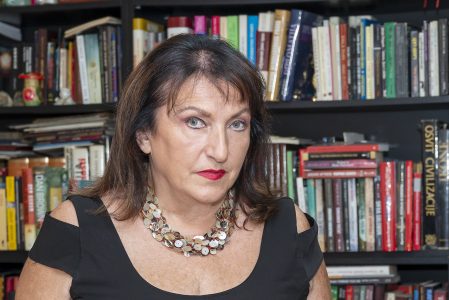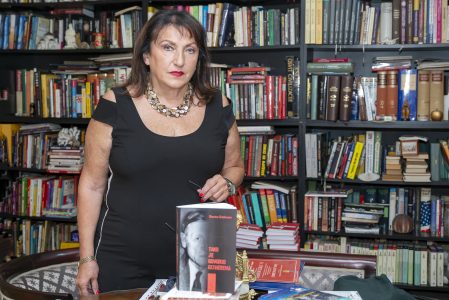Slavica Grahovac’s law firm has several associates, each of whom is in charge of one branch of law. In addition to criminal law, the firm also deals with civil, commercial and other branches of law.
Slavica was given the opportunity to accumulate several decades of work experience and learn perseverance and dedication by working with the renowned attorney Veljko Guberina, a longtime associate and an all-around great man. In honour of him and the promise that she would do everything necessary for Guberina’s legacy not to be forgotten, she wrote the book called “Thus Spoke Guberina” („Tako je govorio Guberina“), which recently had its second (expanded) edition.

The book’s reviewers are attorney Milan Sučević, a man who, at the age of 30, joined the exiled Serbs from Croatia on their road to Serbia in the 1990s and lived through everything that Guberina had lived through at the age of 14, and who came to Serbia as a war refugee from Croatia and was welcomed and accepted by Serbia just like Guberina, and Dr Jovan Janjić, also a lawyer, the chronicler of the Serbian Orthodox Church and author of several books about the Serbian Orthodox Church and Patriarch Pavle.
You started your career by working side-to-side with the prominent attorney Veljko Guberina, to whom you dedicated several books. What are your memories of that period and how important was that for your further career?
My close friendship with the most reputable attorney of that time, Veljko Guberina, started from the moment Dušanka Bojičić founded an etiquette club together with Mr. Guberina. He was looking for associates and as a result of several different circumstances, we officially met and talked on that very day. He immediately offered me to collaborate with him. That was a nice surprise for me, i.e. that the most famous Serbian attorney chose me out of so many young hopefuls. We joked about this many years later and when I asked him why did he pick me, he said: “For beauty and brains.“ Of course, this event directed the further course of my career and life. From that day until Veljko died in 2015, I worked at his firm and on all of his projects related to advocacy. I was in The Hague Tribunal as a member of the team of investigators working for the Serbian side, as well as worked on the pan-Serbian problems, the Serbian diaspora, organizing public addresses, providing rationales regarding the situation in the country during the 1990s war, etc.
“I saw Veljko as my best friend, brother and father. He never let us down and his criticisms were always instructive”
We had so much work to do back then and we were in the public spotlight in the most fateful moments of the existence of a nation. For me, that was a period of learning how and to what extent one loves one’s homeland, how one does not give up and when there are no options left, how one stays with one’s client even after a constitutional complaint, etc. All of his associates and there weren’t many of us, knew and felt that Veljko was with us and was watching our backs, so his passing was a great loss for all of us. He was an old school man with modern ideas, a loyal friend and reliable support in good and evil. I saw Veljko as my best friend, brother and father. He never let us down and his criticisms were always instructive.
As a lawyer, you took on many challenging cases that some of your colleagues refused to. What motivates you to do this and which case has been the most challenging for you so far?
I will start from something that many lawyers would have liked to do but only a handful of them had the opportunity to do and that is to stand up and defend war crimes suspects in The Hague Tribunal. We, as the Guberina Law Firm, were among the first to take on the cases of war crimes suspects from the territory of the former SFRY such as the Erdemović-Kremenović case, where we defended Kremenović, who was the first Serb indicted for war crimes. We won that case and he was subsequently acquitted of all charges. Today he lives near Novi Sad. There was also the case of Mlađa Radić, from the Omarska camp. The position of Serbs suspected of war crimes was very difficult at that time, and even later. When, as Croats used to call them, “a group of brave knights of war” had been indicted by The Hague Tribunal, the Croatian authorities immediately allocated a budget and had liaison officers, as well as made a schedule for family visits to the indicted officers once a month and provided financial backup for every Croat indicted by The Hague Tribunal. We, on the contrary, had absolutely nothing. Families of our indictees had to resort to pleading with wealthy people to give them money to visit their dear ones in prison once or twice a year.
“I believe that small nations, especially those, like us, who are reduced to living in physically small territories, must be politically literate or, better said, familiar with the events in their country and the world”
We did not have a liaison officer just like we did not have a budget or any secure finances for our indictees in The Hague. It all came down to Serbs detained in The Hague demanding from their lawyers that they give them a percentage of their fees so that they could finance their families coming to see them. It was the Hague Tribunal that paid lawyers’ fees if an indictee did not have the means to afford an attorney, so the indictees knew how much money their attorneys were getting for working on their cases. We, the attorneys, accepted such arrangements to a certain extent but some clients resorted to very serious blackmails and threats to their attorneys. Guberina did not want to be exposed to such pressures and his law firm relatively quickly left The Hague Tribunal.
I was invited by the American attorney of Serbian origin, Dušan Vučićević, to act as an investigator in the case of Kovačević and Kolundžija, representing the Serbian side, of course. What lessons did I learn from my engagement at The Hague Tribunal? First of all, that power writes laws and history. Namely, we all acted according to the rules that the Tribunal passed only for those purposes.
The Tribunal’s rules were written in English and Serbian. The proceedings in front of the English- or French- speaking council were also in English and Serbian, or just in Serbian, with translation provided. Since I speak several languages, the agreement was for us to speak in front of the English-speaking council and for me to be a ‘spokesperson’ because I knew the language well. Also, it quickly became clear who were your friends and who your enemies in the Tribunal. The French, as very good connoisseurs of history, were well acquainted with the situation in the Balkans and took our side.

What motivated you as an attorney to write about political issues in your books? What is your view of Serbia’s foreign policy?
I entered politics when I started collaborating with Veljko Guberina and when he continued with the People’s Radical Party. I was even the vice chairwoman of the Executive Board of the People’s Radical Party. I believe that small nations, especially those, like us, who are reduced to living in physically small territories, must be politically literate or, better said, familiar with the events in their country and the world. I was good at analytics, and while working with Veljko Guberina, I developed my analytical skills to such an extent that we were commenting on various newspapers and TV stations on a daily basis, at that time.
As far as foreign policy is concerned, I believe that small countries must have good diplomatic relations with everyone and that we should look up to countries such as Monaco, the Vatican and the Benelux countries and learn how small countries engage in politics and how they manage to survive so far in the 21st century otherwise we would share the same destiny as the Jews.
One of your books is called „Serbian Drama“(„Srpska drama“). Can you tell us what constitutes drama in the Serbian judiciary today?
„Serbian Drama“ is a purely political book of our reactions over 20 years, which begins from the disintegration of the former Socialists Federal Republic of Yugoslavia (SFRY), of which I was a witness too. I am very pleased with this book. As far as today’s judiciary is concerned, I believe that this should be discussed by judicial decision-makers in the country today. I am not in that position, but I would like to draw your attention to several problems – all court proceedings are very slow and take years to complete, the attitude towards all judicial experts is humiliating, especially as far as their fees go, since these are regulated by the laws from 1995 and 2000 respectively and all of them, including court interpreters, now usually avoid working with courts.